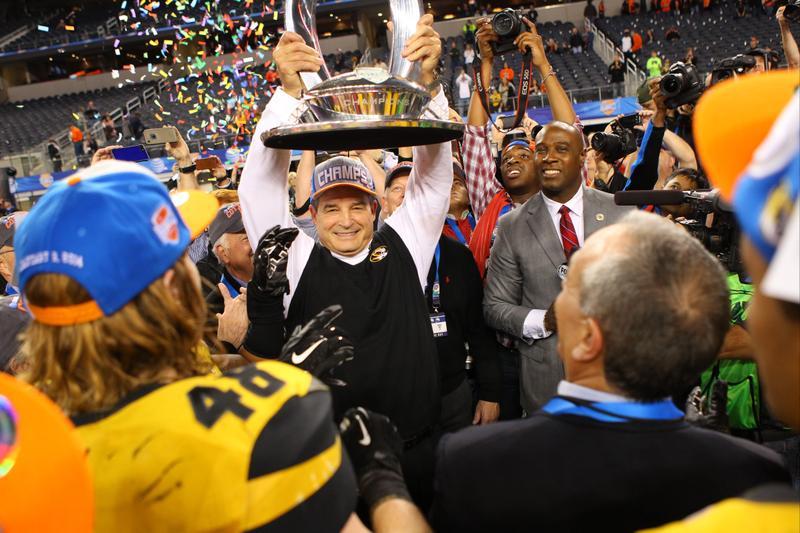
ARLINGTON, Texas — Finally, Gary Pinkel smiled.
Throughout most of the 2014 AT&T Cotton Bowl game, Pinkel crossed his arms and coldly stared. He barely reacted to scores, including sophomore defensive lineman Shane Ray’s fumble recovery for a touchdown that ensured a victory with 55 seconds left in the game.
In fact, he started yelling at his own players to quit celebrating and get off the field, throwing his arms up in anger.
The reaction to the ensured victory seemed distant. He had not only won the Cotton Bowl, but also his 102nd game, solidifying him as the all-time winningest coach in Missouri football history.
He passed Don Faurot, Missouri’s beloved football coach who even has Mizzou’s field named after him.
But Pinkel finally came around after time expired. His visor tilted up and his arms came loose as he hoisted the game trophy through the swirling confetti at AT&T Stadium.
“How about those Tigers?” he yelled. The corners of his lips turned upward for the first time that night.
“I’m very honored,” Pinkel said, after the game, a bit more composed.
—-
Pinkel wasn’t like Don Faurot, who always smiled. Faurot grew up a Tiger and fell in love with the team from his home in Mountain Grove, Mo., a few hours south of Columbia.
Bob Broeg wrote in “One Hundred Greatest Memories in St. Louis Sports History” that Faurot “spent most of his boyhood in Columbia, sneaking into Rollins Field to see the Tigers play.”
Faurot would letter in three varsity sports at Mizzou: football, basketball and baseball. The gridiron, though, was his passion. After graduating, he went on to coach football at his alma mater from 1935-1942 and again from 1946-1956.
In 1935, Faurot grabbed the coach’s whistle after Frank Carideo, who was the quarterback for Knute Rockne’s famous Fighting Irish from 1928-1930. Rockne said Carideo was the greatest quarterback he had ever seen.
Carideo was not as great as a coach. He led Missouri to a 2-23-2 record over his three years of coaching. The team was $500,000 in debt when he left.
Faurot, though, went on to a Missouri Hall of Fame career. He paid off the debt, compiled a 101-79-10 record and brought the Tigers to four bowl games. (He didn’t win any of them.) Faurot even invented the Split-T, an offensive innovation.
After his coaching career, Faurot served as the athletic director at Missouri until 1966. Just as his life revolved around the Missouri program, he was forever immortalized in a statue in 1999 at Faurot Field’s north entrance, hands resting on his hips and smiling.
—-
Pinkel also walked into a bleak situation. The sagging Missouri program had found itself in the dark ages after the fall of the Faurot and later the Warren Powers era. In 2000, the year before Pinkel, coach Larry Smith had led the Tigers to a dismal 3-8 year.
But like Faurot, Pinkel had a plan. He raised Missouri on the spread, a high-intensity system that has ushered nearly limitless offensive prosperity for Missouri.
On paper, Pinkel has done the clichéd thing and “turned the program around.” He’s taken the Tigers to nine bowls, winning five of them. He ended long losing streaks to Nebraska in 2003 and Oklahoma in 2010.
When there was a rivalry, Pinkel whooped Kansas over and over again, most famously in 2007 in the “No. 1-No. 2” game that nearly launched Missouri to a national title game.
Unlike Faurot, though, Pinkel has been an adopted son of Missouri. He never stole into Tiger football games as a kid. Pinkel went to Kent State, playing tight end during the Vietnam war and around the infamous Kent State shootings.
Pinkel was more real than the rigid statue could ever tell us about Faurot. He enjoys to drive his Harley Davidson alone around town. He was arrested for driving while intoxicated in 2011. He finalized his divorce a year later.
His sometimes frigid style of communication has led to Google Hangouts in the place of real ones. Even when he does talk in person, his tough coaching demeanor gives high school kids the shivers, as they nervously approach the question stand when he speaks at father’s club banquets.
But tonight, Pinkel broke the ice when he smiled. He deserved to smile. He had won a bowl game, a record and probably a statue in the near future.
But tonight meant more than that. Gary Pinkel smiled because he knew he had earned a spot among the immortal football coaches around Faurot Field that whisper until the end of time.